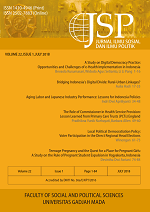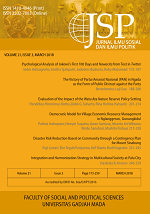Explaining civilian control of militarisation in Indonesia: The case of military law amendment
Aditya Batara Gunawan(1*)
(1) Political Science Department, Universitas Bakrie, Indonesia
(*) Corresponding Author
Abstract
This study explores the civilian control of militarisation practice in Indonesia, which refers to the discursive politics involving citizenry in the legitimisation mechanism of the use of military force for defence and non-defence objectives. To explore the empirical manifestation of the concept, the study applies the discourse network analysis method, which combines qualitative content analysis and social network analysis to investigate the public debates over the military law amendment. Accordingly, the study collected a dataset of 227 statements from 55 actors in 118 news articles on the military law amendment from May to July 2023. The analysis reveals that, first, the discourse was dominated by actors from non-governmental organisations, think tanks, and academia. Second, the discourse was driven by several main concerns, such as the return of military dual-function doctrine, the current state of military personnel occupying civilian posts, and the urgency of public participation in the deliberation process of the amendment. This article argues that the configuration of the dominant actors and the prominent issues reflect the prevalence of inward-looking defence policy orientation issue in Indonesia.
Keywords
Full Text:
PDFReferences
Achmad, N. (2024, March17). Imparsial Nilai PP Manajemen ASN Akan Perluas Masuknya TNI-Polri ke Ranah Sipil. Kompas. https://nasional.kompas.com/read/2024/03/17/20360841/imparsial-nilai-pp-manajemen-asn-akan-perluas- masuknya-tni-polri-ke-ranah
Agüero, F. (1995). Democratic Consolidation and the Military in Southern Europe and South America. In N. Diamondourous & H. J. Puhle (Eds.), The Politics of Democratic Consolidation: Southern Europe in Comparative Perspective (pp. 124–165). The John Hopkins University Press.
Anggoro, K. (2008). Unravelling Total Defense: Territorial Structure, Democracy and Non-Military Defense. In B. Sukadis & E. Hendra (Eds.), Total Defense and Military Conscript: Indonesia’s Experience and Other Democracies (1st ed., pp. 11–24). Lesperssi and DCAF Geneva.
Araf, A., Aliabbas, A., Adiputra, A. M., Aprilia, A. Y., Mengko, D. M., Budiawan, E., Mabruri, G., Ahmad, H., & Sujono, S. (2020). Peran Internal Militer: Problem Tugas Perbantuan TNI (2nd ed.). Imparsial.
Brennan, J. (2016). Against Democracy. Princeton University Press.
Bruneau, T. C. (2005). Civil-Military Relations in Latin America: The Hedgehog and the Fox Revisited. Revista Fuerzas Armadas y Sociedad, 19(1), 111–131.
Bruneau, T. C., & Croissant, A. (2019). Civil- Military Relations: Why Control Is Not Enough. In T. C. Bruneau & A. Croissant (Eds.), Civil-Military Relations: Control and Effectiveness Across Regimes (pp. 1–18). Lynne Rienner Publishers.
Bruneau, T. C., & Matei, F. C. (2008). Towards a New Conceptualization of Democratization and Civil-Military Relations. Democratization, 15(5), 909–929.
Chairil, T. (2020). Indonesian Government’s COVID-19 Measures, January–May 2020: Late Response and Public Health Securitization. Jurnal Ilmu Sosial Dan Ilmu Politik, 24(2), 126–152.
Chairullah, E. (2023, May 12). Wapres: Revisi UU TNI Jangan Bangkitkan Dwifungsi. Media Indonesia. https://mediaindonesia.com/politik-dan-hukum/580728/wapres-revisi- uu-tni-jangan-bangkitkan-dwifungsi
Cottey, A., Edmunds, T., & Forster, A. (2002). The Second generation problematic: rethinking democracy and civil-Military Relations. Armed Forces & Society, 29(1), 31–56. https://doi.org/10.1177/0095327X0202900103
Croissant, A., Kuehn, D., Lorenz, P., & Chambers, P. W. (2013). Democratization and civilian control in Asia . Palgrave Macmillan.
Croissant, A ., & Kuehn, David. (2017). Reforming Civil-Military Relations in New Democracies. In Reforming Civil- Military Relations in New Democracies. Springer VS. https://doi.org/10.1007/978-3-319-53189-2
Croissant, A., Kühn, D., Chambers, P. W., Völkel, P., & Wolf, S. O. (2011). Theorizing civilian control of the military in emerging democracies: agency, structure and institutional change. Zeitschrift Für Vergleichende Politikwissenschaft, 5(1), 75–98. https://doi.org/10.1007/s12286-011-0101-6
Crouch, H. (2007). The Army and Politics in Indonesia (An Equinox). Equinox Publishing Asia Ltd.
Eriyanto, E. (2022). Analisis Jejaring Wacana. Rosda Karya.
Eriyanto, E., & Ali, D. J. (2020). Discourse network of a public issue debate: A study on covid-19 cases in Indonesia. Jurnal Komunikasi: Malaysian Journal of Communication, 36(3), 209–227.
Fisher, D. R., & Leifeld, P. (2019). The polycentricity of climate policy blockage. Climatic Change, 155(4), 469–487. https://doi.org/10.1007/s10584-019-02481-y
Fisher, D. R., Leifeld, P., & Iwaki, Y. (2013). Mapping the ideological networks of American climate politics. Climatic Change, 116(3), 523–545. https://doi.org/10.1007/s10584-012-0512-7
Freeman, L. C. (1978). Centrality in social networks conceptual clarification. Social Networks, 1 (3), 215–239. https://doi.org/10.1016/0378-8733(78)90021-7
Ghinoi, S., & Steiner, B. (2020). The Political Debate on Climate Change in Italy: A Discourse Network Analysis. Politics and Governance, 8(2), 215–228. https://doi.org/10.17645/pag.v8i2.2577
Girvan, M., & Newman, M. E. J. (2002). Community structure in social and biological networks. Proceedings of the National Academy of Sciences, 99(12), 7821–7826. https://doi.org/10.1073/pnas.122653799
Golbeck, J. (2013). Network Structure and Measures. In J. Golbeck (Ed.), Analyzing the Social Web (pp. 25–44). Morgan Kaufmann. https://doi.org/https://doi.org/10.1016/ B978-0-12-405531-5.00003-1
Golbeck, J. (2015). Introduction to Social Media Investigation: A Hands-on Approach. Elsevier.
Gunawan, A. B. (2017). Civilian control and defense policy in Indonesia’s Nascent democracy. In A. Croissant & David. Kuehn (Eds.), Reforming civil-military relations in new democracies (pp. 129–150). Springer VS.
Gunawan, A. B. (2019). Indonesia: The Military’s Growing Assertiveness on Nondefense Missions. In T. C. Bruneau & A. Croissant (Eds.), Civil Military Relations: Control and Effectiveness Across Regimes (pp. 141–156). Lynne Rienner Publishers.
Hansen, D., Shneiderman, B., & Smith, M. (2011). Analyzing Social Media Networks with NodeXL. Elsevier. https://doi.org/10.1016/C2009-0-64028-9
Haripin, M. (2020). Civil-military Relations in Indonesia: The Politics of Military Operations Other Than War. Routledge.
Haripin, M., Priamarizki, A., & Nugroho, S. S. (2023). Quasi-civilian defence minister and civilian authority: The case study of Indonesia’s Ministry of Defence during Joko Widodo’s presidency. Asian Journal of Comparative Politics, 8(1), 164–183. https:// doi.org/10.1177/20578911221141016
Imparsial. (2022, May 19). Darurat Militerisasi Sipil: Telaah Kritis Pembentukan Komponen Cadangan Melalui UU No. 23 Tahun 2019 Tentang PSDN. Imparsial. https://imparsial.org/darurat-militerisasi-sipil- telaah-kritis-pembentukan-komponen- cadangan-melalui-uu-no-23-tahun-2019- tentang-psdn/
Innanchai, Y. (2012). The Roles of the Legislature and Civil Society in Civil-Military Relations [Ph.D Dissertation]. Northern Illinois University.
Kimmerling, B. (1993). Patterns of militarism in Israel. European Journal of Sociology, 34(2), 196–223. https://doi.org/10.1017/S0003975600006640
Kohn, R. H. (1997). How democracies control the military. Journal of Democracy, 8(4), 140–153.
Kuehn, D., & Levy, Y. (2020). Material and Discursive Militarisation in Democracies (06; GIGA Focus).
Kuehn, D., & Levy, Y. (2021). Militarization: The Missing Link Between Threats and Civilian Control. In D. Kuehn & Y. Levy (Eds.), Mobilizing Force: Linking Security Threats, Militarization, and Civilian Control (1st ed.). Lynne Rienner Publishers.
Laksmana, E. (2019a). B etween M ilitary Corporate Interests and Presidential Handholding. Asia Policy, 14(4), 63–71. https://www.jstor.org/stable/26867615
Laksmana, E. (2019b). Reshuffling the Deck? Military Corporat ism, Promotional Logjams and Post-Authoritarian Civil- Military Relations in Indonesia. Journal of Contemporary Asia, 49(5), 806–836. https://doi.org/10.1080/00472336.2019.1613556
Laksmana, E. (2024). Retail path-dependence: Indonesia’s post-authoritarian defence planning. In T. Sweijs, S. , Van Genugten, & F. Osinga (Eds.), Defence Planning for Small and Middle Powers, Rethinking Force Development in an Age of Disruption (forthcoming). Routledge.
Laksmana, E., & Taufika, R. (2020). How “militarized” is Indonesia’s COVID-19 management? Preliminary assessment and findings. https://csis.or.id/publication/how-militarized-is-indonesias-covid-19- management-preliminary-assessment- and-findings/
Leifeld, P. (2016a). Discourse Network Analysis: Policy Debates as Dynamics Network. In J. N. Victor, A. H. Montgomery, & M. Lubell (Eds.), The Oxford Handbook of Political Networks (Vol. 1, pp. 301–326). Oxford University Press. https://doi.org/10.1093/ oxfordhb/9780190228217.013.25
Leifeld, P. (2016b). Policy Debates as Dynamic Networks: German Pension Politics and Privatization Discourse. Chicago University Press.
Leifeld, P., & Haunss, S. (2012). Political discourse networks and the conflict over software patents in Europe. European Journal of Political Research, 51(3), 382–409. https ://do i.org/10.1111/j.1475- 6765.2011.02003.x
Levy, Y. (2016). What is Controlled by Civilian Control of the Military? Control of the Military vs. Control of Militarization. Armed Forces & Society, 42(1), 75–98. https://www.jstor.org/stable/48670052
Liu, W., Sidhu, A., Beacom, A. M., & Valente, T. W. (2017). Social Network Theory. In The International Encyclopedia of Media Effects (pp. 1–12). Wiley. https://doi. org/10.1002/9781118783764.wbieme0092
Lorenz, P. (2015). Principals, Partners and Pawns: Indonesian Civil Society Organizations and Civilian Control of the Military. Ruprecht Karl University of Heidelberg.
MacDougall, J. A. (1982). Patterns of Military Control in the Indonesian Higher Central Bureaucracy. Indonesia, 33, 89–121. https://doi.org/10.2307/3350927
Mengko, D. M. (2015). Problematika Tugas Perbantuan TNI (Problems of TNI’s Assistance Role). Keamanan Nasional, 1(175–195).
Mietzner, M. (2006). The politics of military reform in post-suharto Indonesia: Elite conflict, nationalism and institutional resistance. East-West Center.
Mietzner, M. (2009). Military Politics, Islam and the State in Indonesia: From Turbulent Transition to Democratic Consolidation. ISEAS.
Mietzner, M. (2011). Overcoming Path Dependence: The Quality of Civilian Control of the Military in Post- Authoritarian Indonesia. Asian Journal of Political Science, 19(3), 270–289. https://doi.org/10.1080/02185377.2011.628148
Movanita, A. (2015, January 8). Wujudkan Ketahanan Pangan, TNI Teken MoU dengan Kementerian Pertanian (To achieve sustainability in food production, TNI signed MOU with the Ministry of Agriculture). KOMPAS. http://bisniskeuangan.kompas.com/ read/2015/01/08/172821626/Wujudkan.Ketahanan.Pangan.TNI.Tek en.MoU.dengan.Kementerian.Pertanian
Muhtadi, B. (2022). The Indonesian Military Enjoys Strong Public Trust and Support: Reasons and Implications. ISEAS-Yusof Ishak Institute.
Mujani, S., & Liddle, R. W. (2021). Indonesia: Jokowi Sidelines Democracy. Journal of Democracy, 32(4), 72–86. https://doi.org/10.1353/jod.2021.0053
Ng, J., & Kurniawan, Y. (2022). The Parliament and Cooperative Oversight of the Indonesian Armed Forces: Why Civil– Military Relations in Indonesia is Stable but Still in Transition. Armed Forces & Society, 0095327X2211372. https://doi. org/10.1177/0095327X221137281
Notosusanto, N. (1984). Pejuang dan Prajurit: Konsepsi dan Implementasi Dwifungsi ABRI (Fighter and Soldier: Conception and Implementation of ABRI’s Dwifungsi). Penerbit Sinar Harapan.
Patty, J. W., & Penn, E. M. (2015). Analyzing Big Data: Social Choice and Measurement. PS: Political Science & Politics, 48(1), 95–101. https://doi.org/10.1017/S1049096514001814
Pradana, B. (2023, May 10). Pemerintah Diminta Tinjau Ulang Revisi UU TNI Guna Kembalikan Dwifungsi. Vivanews. https:// www.viva.co.id/berita/nasional/1598986-pemerintah-diminta-tinjau-ulang-revisi-uu-tni-guna-kembalikan-dwifungsi
Rahayu, K., & Basari, I. (2024, May 21). Jejak Pengabaian Publik Penyusunan Regulasi Era Jokowi. Kompas. https://www.kompas.id/baca/english/2024/05/20/jejak-pengabaian-publik-penyusunan-regulasi-era-jokowi?open_from=Translator_Mark
Ramadan, A., & Prabowo, D. (2023, May 22). Soal Wacana Revisi UU TNI, Moeldoko: Enggak Usah Takut Berlebihan. Kompas. https://nasional.kompas.com/read/2023/05/22/20185011/soal-wacana-revisi-uu-tni-moeldoko-enggak-usah-takut-berlebihan
Ramadhani, N. F., & Halim, H. (2017, February 23). Democracy ‘gone too far’: Jokowi. The Jakarta Post. https://www.thejakartapost.com/news/2017/02/23/democracy-gone-too-far-jokowi.html
Rinakit, S. (2005). Indonesian military after the new order. ISEAS.
Sambhi, N. (2023). Jokowi’s Generals, Civilian Control, and the Power of the Panglima. Journal Of Global Strategic Studies, 3(1), 21–42. https://doi.org/10.36859/jgss.v3i1.1614
Saputra, A. R. (2022). The problems of Fast Track Legislation in the Formation of Laws in Indonesia [Pos tgraduate Thesis]. University of Indonesia.
Scarpello, F. (2014). Stifled Development: The SSR—Civil Society Organizations Community in Post-authoritarian Indonesia. In F. Heiduk (Ed.), Security Sector Reform in Southeast Asia: From Policy to Practice (pp. 131–158). Palgrave Macmillan UK. https://doi.org/10.1057/9781137365491_6
Schofield, J. (2007). Militarization and War. Palgrave Macmillan US. https://doi.org/10.1007/978-1-137-07719-6
Sebők, M., Kiss, R., & Kovács, Á. (2023). The Concept and Measurement of Legislative Backsliding. Parliamentary Affairs, 76(4), 741–772. https://doi.org/10.1093/pa/gsad014
Steele, J. (2023, June 14). Digital News Report: Indonesia. Reuters Institute. https://reutersinstitute.politics.ox.ac.uk/digital-news-report/2023/indonesia
Sucipto, T. (2023, May 21). Usulan Revisi UU TNI Disebut Problematis, Kenapa? Medcom. https://www.medcom.id/nasional/politik/ GNlMPqGb-usulan-revisi-uu-tni-disebut-problematis-kenapa
Sugandi, A. T. (2023, May 24). Gerilya Militer di Kementerian dan Lembaga Sipil. Https://News.Detik.Com/x/Detail/Spotlight/20230524/Gerilya-Militer-Di-Kementerian-Dan-Lembaga-Sipil/. https://news.detik.com/x/detai l/spotlight/20230524/Gerilya-Militer-di- Kementerian-dan-Lembaga-Sipil/
Trinkunas, H. A. (2001). Crafting Civilian Control in Argentina and Venezuela. In D. Pion-Berlin (Ed.), Civil-Military Relations in Latin America: New Analytical Perspectives (pp. 161–193). University of North Carolina Press.
Utami, S. (2023, May 11). Revisi UU TNI, DPR Jamin tidak Menghidupkan Dwifungsi TNI . Media Indonesia. https://mediaindonesia.com/politik-dan-hukum/580728/wapres-revisi-uu-tni-jangan-bangkitkan-dwifungsi
Uzma, H. (2024, April 7). KORPRI Minta TNI/ POLRI Diatur Secara Ketat di PP Manajemen ASN. Detiknews. https://www.detik.com/sulsel/berita/d-7283507/korpri-minta-tni-polri-diatur-secara-ketat-di-pp-manajemen-asn
Wallaschek, S., Starke, C., & Brüning, C. (2020). Solidarity in the Public Sphere: A Discourse Network Analysis of German Newspapers (2008–2017). Politics and Governance, 8(2), 257–271. https://doi.org/10.17645/pag.v8i2.2609
Warburton, E. (2016). Jokowi and the New Developmentalism. Bulletin of Indonesian Economic Studies, 52(3), 297–320.
Wardana, D. J., Sukardi, S., & Salman, R. (2023). Public Participation in the Law-Making Process in Indonesia. Jurnal Media Hukum, 30(1), 66–77. https://doi.org/10.18196/jmh.v30i1.14813
Widjajanto, A. (2006). Evolusi Doktrin Pertahanan Indonesia. In I. N. Bhakti (Ed.), Kaji Ulang Pertahanan: Pendekatan Substantif (pp. 1–31). LIPI Press.
Widjajanto, A. (2010). Evolusi Doktrin Pertahanan Indonesia, 1945-1998 (The Evolution of Indonesia’s Defence Doctrine, 1945-1998). Prisma, 1(1).
Yosarie, I., & Kosandi, M. (2023). Analisis Penempatan Prajurit TNI di Jabatan Sipil Pada Masa Orde Baru dan Pascareformasi. Indonesian Journal of Religion and Society, 5(2), 82–94. https://doi.org/10.36256/ijrs.v5i2.352
Article Metrics
Refbacks
- There are currently no refbacks.
Copyright (c) 2024 Jurnal Ilmu Sosial dan Ilmu Politik

This work is licensed under a Creative Commons Attribution-ShareAlike 4.0 International License.






















